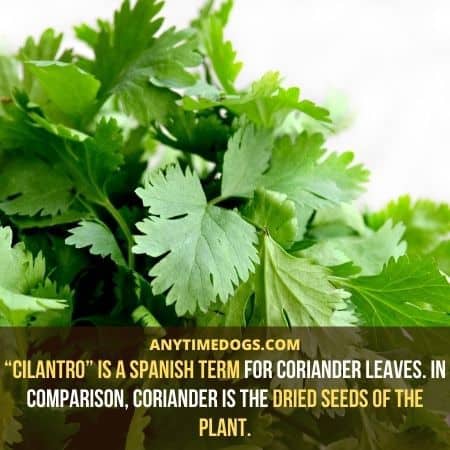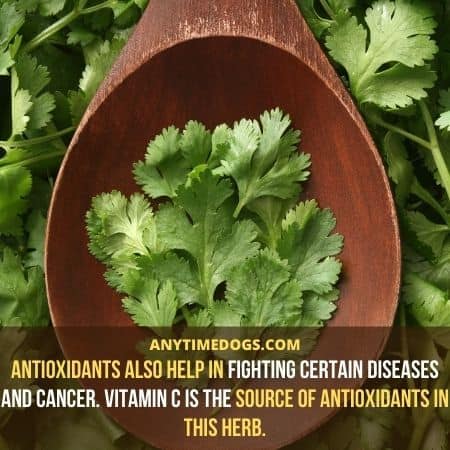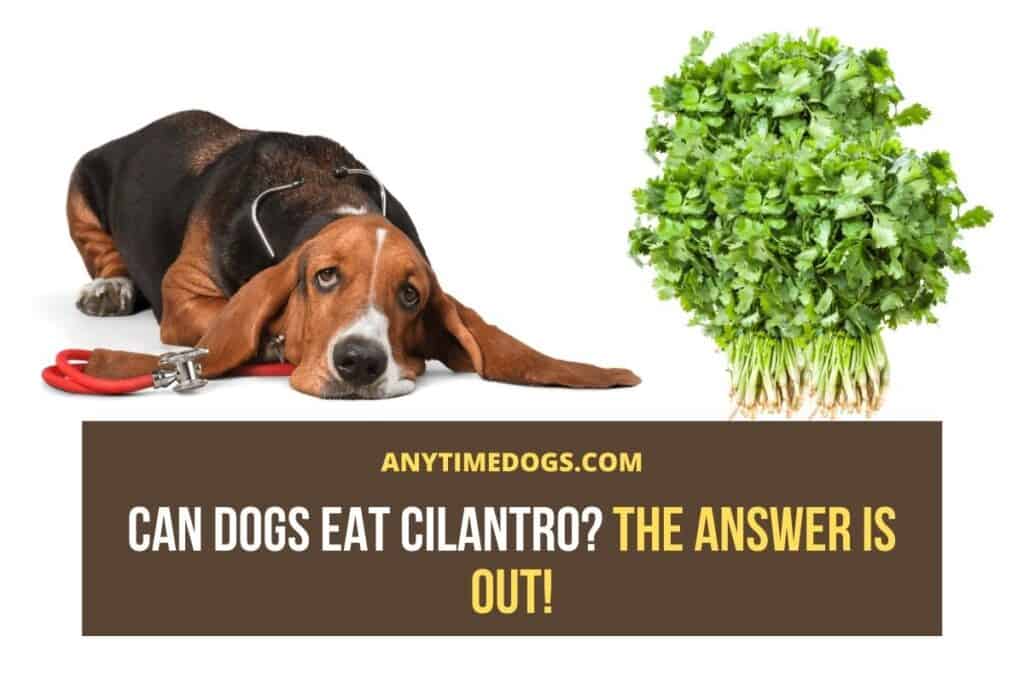We love to add herbs to most of our dishes. But, when it comes to dogs, most herbs are harmful to them. Now, what about cilantro? Can dogs eat cilantro? The answer to the above question is yes. Dogs can eat cilantro in moderate amounts.
Cilantro is commonly called “coriander.” Some refer to it as “Chinese parsley.” Most people add it to their salads, guacamole, or even salsa!
Apart from its unique flavor, it is also rich in vitamins and minerals for humans. But is it a safe pick for dogs?
Do they benefit from it as well? In this article, we shall uncover the truth!
Is Cilantro Safe For Canines?
There many herbs which are toxic to dogs, but cilantro isn’t one of them. Cilantro is safe for your pet friend.
Feeding in regulated amounts of cilantro is beneficial for dogs. But you shouldn’t use it as a primary source of nutrients for your pup.
1) What Happens If Dogs Overeat Cilantro?
Can dogs eat cilantro? Yes, it is safe for them. But, if your pup accidentally overeats cilantro, it causes:
- Nausea
- Vomiting
- Diarrhea

Dog’s tummy gets upset after the addition of new stuff in their diet. Hence, you must start with small amounts. Lots of cilantro in their meal will make them surprised and less interested in eating.
2) How Much Of Cilantro Is Too Much For Dogs?
Cilantro is one of those herbs that has a distinctive taste. It divides people at two opposite ends, one those who love it and those who dislike it.
The same is with dogs. Some will love it, while others will refuse to eat the new addition to their meal.
The best way to add any food to their regular diet is in small amounts. Once you notice that your pooch loves it, add it more in their next meal.
Now, the question is, how much should you add?
Adding small quantities gradually helps in checking any allergic reactions in your pooch. In this way, they won’t have an upset stomach.
Adding a pinch in their regular food is a safe starting point. Notice for any symptoms for a few weeks. If your dog likes it, well, and good!
You can then increase it to one teaspoon in their meal, few times a week. However, you shouldn’t add more than this. It will overpower their food and can upset your dog’s tummy.
3) What Form Of Cilantro Is Best For Canines?
Cilantro comes from the species Coriandrum sativum. People around the world call it by different names.

“Cilantro” is a Spanish term for coriander leaves. In comparison, coriander is the dried seeds of the plant. Both the forms are readily available in the spice aisle of stores.
Both the forms are non-toxic and healthy for dogs. However, the leaves contain higher minerals and vitamins as compared to the powder.
Thus, it is better that you sprinkle some leaves on their food. It means dogs should eat cilantro leaves only.
4) Serving Tips For Cilantro To Dogs
As we mentioned above, fresh cilantro leaves are a good choice as compared to the powder. You can chop the leaves and add them to their food.
You can also sprinkle the leaves if your pet doesn’t mind it. If your dog is a picky eater, you can try a pinch of coriander powder as well. It is good that you mix it in the food they like. Dogs love to eat eggplant, you can sprinkle fresh cilantro on your pup’s boiled eggplant

Food like salsa and guacamole contains cilantro. But, you shouldn’t give them these dishes AT ALL! Fresh leaves and coriander powder is only suitable for dogs.
Some dogs turn their nose up if they don’t like anything. It is better not to force them to eat something they don’t enjoy.
Forcing feeding your dog will make them go off from their food. Imagine happening to you; we are sure you won’t like it!
7 Health Benefits Of Cilantro For Dogs
This herb is a part of seasoning in many dishes like pasta, chicken, or spaghetti sauce. We only enjoy it for taste. And, don’t even think of the benefits it provides us with!
Cilantro has vitamin A, C, K, iron, magnesium, and calcium in a significant amount. Its benefits are not only limited to humans but essential for dogs too!
Let’s have a look at how these nutrients help a dog to remain healthy
1) Improve A Canine’s Breath:
Using cilantro is a natural way to freshen up a dog’s breath. It also helps in fighting gum infections.
Some dogs don’t like to get their teeth brushed. This herb is an excellent way to clean their teeth. Its refreshing smell speaks for itself that how much helpful it is for the mouth.
2) Fight Off Diseases:
According to studies, cilantro has anti-fungal and anti-bacterial properties.
In this way, it helps the dog to fight off infections. Especially, bacteria inside the stomach quickly become a target of anti-bacterial elements.
3) Excellent Source Of Antioxidants:
Cilantro is rich in antioxidants. These help the body’s cells to defend them from harmful molecules called free radicals.

Antioxidants also help in fighting certain diseases and cancer. Vitamin C is the source of antioxidants in this herb. It also helps in strengthening the immune system and promote joint health.
4) Maintains Blood Regulation:
Dogs have a playful nature; they need to have strong bones for this reason. Moreover, they tend to get minor cuts quite often.
Cilantro contains vitamin K too. This vitamin helps in blood clotting and maintains blood vessels.
Vitamin K also plays a vital role in maintaining healthy bones. Besides, it also preserves the lustrous fur of your pooch.
5) Enhances The Skin And Vision:
Cilantro contains vitamin A which is responsible for maintaining the skin and eyesight.
It also keeps other organs healthy by strengthening the immune system.
6) Improves Digestion Process:
Cilantro is being used as a traditional medicine for hundreds of years. People say it helps to settle an upset stomach and other digestive problems in humans.

Some people use it as a natural remedy for dogs. If your canine friend has a sensitive stomach or excessive gas, cilantro is the hero!
Adding this herb in a small amount to their diet will cure stomach gas and other digestive problems.
7) Helps In Muscle Contraction:
Along with calcium, it contains magnesium too. Both of these help in muscle contraction.
It is also beneficial for nerve transmission and boosts metabolism. Dogs lead an active lifestyle. They love to play and run around.
The deficiency of magnesium can cause muscle cramps. It also causes hindrance in the transmission of nerve signals to different parts of the body.
3 Major Risks Of Feeding Cilantro To Dogs
Till now you know why can dogs eat cilantro. There are chances that your dog is allergic to cilantro. Some people can also develop an allergy to it.

Healthy skin and good eyesight are all pros of cilantro. It is also jam-packed with potent antioxidants. These can help prevent certain cancers and diseases!
Ensure that you introduce any new food very slowly. In this way, you will notice if your dog has an allergic reaction or any stomach upset after eating it.
It is uncommon, but that doesn’t mean it cannot happen to your pup. Before introducing any new food, it is vital to do a test first.
An allergic reaction can have the following symptoms:
- Vomiting
- Diarrhea
- Swelling on face or body
A puffed-up face or body is a sign of a severe allergic reaction. If you see any swelling, take them to the vet immediately.
The Difference Between Cilantro And Coriander
People refer to cilantro as the leaves and stalk of the plant. While the dried seeds are coriander seeds.
1) They Differ In Nutritional Value:
Even though they come from identical plants, both have slightly different nutritional value.
Let’s have a look at what a 10-gram serving of cilantro contains:
- Dietary fiber – 1%
- Vitamin C – 5%
- Vitamin K – 8%
- Calcium – 7%
- Vitamin A – 5%
- Magnesium – 6%
- Iron – 1%
Now, compare it with 10- gram of coriander:
- Dietary fiber – 8%
- Vitamin A – 0%
- Vitamin C – 5%
- Calcium – 1%
- Vitamin K – 0%
- Magnesium – 2%
- Iron – 1%
The difference is clear; coriander doesn’t contain the essential vitamins. Moreover, the high amount of iron can upset your pup’s tummy.
The water content in cilantro is 92.2%, while coriander contains only 8.9% of water.
2) They Differ In Smell And Taste:
Interestingly, both forms have different tastes and flavors!
The herb, cilantro, has a citrusy taste and refreshing fragrance. Its aroma is what most people love. On the contrary, people who dislike cilantro perceive its smell as “foul” or “soapy.”
Coriander has a lesser polarizing smell and taste. Its aroma is spicy, warm, and nutty with a hint of citrus.
People around the world use it as a spice and pair it with cumin and cinnamon as they share a similar taste.
After looking at the nutritional value, we can say cilantro is the best choice for dogs. If we compare the taste, most dogs will love cilantro due to its refreshing smell.
What’s The Secret To A Dog’s Good Health?
A well-balanced and good quality food is essential for dogs. Dry or wet commercial food, both are okay for pups.

Sometimes, your pet may want a different variety in their food. You can bring the change by adding safe vegetables and herbs to their diet. Edamame beans are another safe vegetable for your pooch.
Some human treats like a can of soda and Doritos aren’t safe for dogs AT ALL. You shouldn’t give them no matter how much they beg for it.
Herbs like cilantro are safe and healthy for dogs. You can add them to their diet a couple of times a week. Hence, dogs can eat cilantro.
Still, you must ask a vet before adding anything new to your canine friend’s diet. They are well aware of your pup’s health history.
Can Dogs Eat Cilantro? Conclusion:
Cilantro contains tons of vitamin A, C, and K. Along with minerals iron, manganese, and potassium. Good quality and well-balanced dog food ensures adequate essential vitamins and minerals
However, dogs do need a change. This is why you might want to improve the flavor of your dog’s meal. Cilantro is a harmless and wholesome supplement to feed your dog. If given in controlled quantities it has fascinating health perks for your canine.
It helps with digestive issues, freshening his breath. If your dog overeats cilantro, it can cause nausea, vomiting, or diarrhea.
Generally, a minor quantity of cilantro incorporated in dog’s food a couple of times a week is sufficient. If you have any problems regarding your dog’s supplementations, ask your veterinarian.

